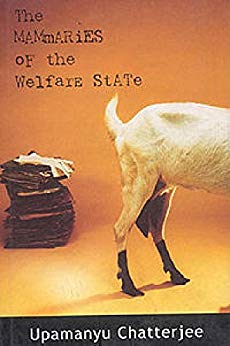Background
Upamanyu Chatterjee was born on December 19, 1959, in Patna, Bihar, India. He is a son of Sudhir Ranjan Chatterjee.

Sudhir Bose Marg, University Enclave, New Delhi, Delhi 110007, India
Upamanyu Chatterjee studied at Saint Stephen's College in New Delhi.
Benito Juarez Marg, South Campus, South Moti Bagh, New Delhi, Delhi 110021, India
Upamanyu Chatterjeer received a Master degree in English Literature at the University of Delhi.
Giles Ln, Canterbury CT2 7NZ, United Kingdom
Upamanyu Chatterjeer worked as a writer in residence at the University of Kent in 1990.









(In the sequel to Upamanyu Chatterjee’s debut novel, ‘Engl...)
In the sequel to Upamanyu Chatterjee’s debut novel, ‘English, August’, Agastya Sen – older, funnier, more beleaguered, almost endearing – and some of his friends are back
https://www.amazon.com/gp/product/B01H23KHAA/?tag=2022091-20
2000

(Witty, macabre, sad, cruel, unforgivingly insightful, the...)
Witty, macabre, sad, cruel, unforgivingly insightful, the story is part adventure tale, part nightmare, part acid trip-and throughout a triumph of fiction
http://www.amazon.com/gp/product/9351774112/?tag=2022091-20
2014
Upamanyu Chatterjee was born on December 19, 1959, in Patna, Bihar, India. He is a son of Sudhir Ranjan Chatterjee.
Upamanyu Chatterjee studied at Saint Xavier's School and at Saint Stephen's College in Delhi.
While in the College, Chatterjee’s story, adopted from a drama, 'Dilemma' by Hitchcock, satirizing the school rules gave him a first place in the school drama competition.
Later, Chatterjee pursued his training at the University of Delhi where he obtained a Master's degree in English Literature.
Upamanyu Chatterjee started his professional career from a post at the Indian Administrative Service. In 1983, he became an officer from Maharashtra Cadre. Five years later, he published his first novel, ‘English, August: An Indian story’. The story taking on the bureaucracy of the Indian Administrative Service provided its author with international acclaim. Two years after the publication, Chatterjee was appointed a writer in residence at the University of Kent, in Canterbury, United Kingdom.
During the subsequent twelve years, he issued three more novels and a number of short stories. His second novel of 1993 called ‘The Last Burden’ tells the story of an Indian family living at the end of the twentieth century.
Chatterjee has always combined the work on his books with an administrative activity. So, in 1998, he became the Director in the Ministry of Human Resource Development, Government of India.
The sequel to his first success, ‘The Mammaries of the Welfare State’ was published in 2000. Six years later, he presented to the public his dark comedy titled ‘Weight Loss’. ‘The Assassination of Indira Gandhi’ and ‘Watching Them’ are the most remarkable from his short stories.
A couple of his latest works include ‘Way To Go’, 2010 and ‘Fairy Tales at Fifty’, 2014.
Nowadays, Upamanyu Chatterjee works as a Joint Secretary to the Government of India on the Petroleum and Natural Gas Regulatory Board.
Upamanyu Chatterjee is considered as one of the most powerful authors in postcolonial literature of India. He was the first from the contemporary generation of Indian writers who managed to achieve international acclaim.
Chatterjee’s accomplishments in writing were marked by the Sahitya Akademi Award for his novel ‘The Mammaries of the Welfare State’. He was also named an Officer of the Order of Arts and Letters by the French Government.
(In the sequel to Upamanyu Chatterjee’s debut novel, ‘Engl...)
2000(Witty, macabre, sad, cruel, unforgivingly insightful, the...)
2014(An intensely moving examination of family ties and the re...)
2010(Tracking backwards and forwards in time and space, the bo...)
1993(In this novella of stunning force and impact, a true orig...)
2018(An inspired and hilarious satire and a timeless story of ...)
1988
Quotations:
"It's a huge headache - the more money you have, the more hassles. I find money very uncomfortable."
"Advances don't fundamentally interest me. It sounds terribly naive, but money doesn't really mean anything to me. If a lot of money came my way, I'm certainly not going to say no. But it hasn't come my way as yet, and I'm not heartbroken."
"No one reveals himself more completely to others than to himself – that is, if he reveals himself at all."
"People should have literary and cultural taste and should not bomb hotels."
"Only when you die will you cease to feel ridiculous."
"Well, life is dark, isn't it? Mostly, it's dreadful. At the same time, death is funny too. I mean, look at the fuss we make of it."
"For me, comedy is richer and larger than anything else."
"I don't think I would do better books if I wrote full time. I write for amateurish reasons."
"So much better to write pen on paper; you can do it anywhere, say, while stuck at the airport."
"Governance is complex, difficult, and on the whole, thankless - why ever should the Bright Young Things leave the management of their hotels, newspapers, banks, TV channels and corporations to join, like fleas on a behemoth, the government? Wherein lies the difference between the two worlds?"
"So much better to write pen on paper; you can do it anywhere, say, while stuck at the airport."
"God is a first-rate bureaucrat, one of the best. In all matters, He sees the truth, but is yet to take a decision."
Quotes from others about the person
"Eighty years apart, cultures, civilisations, even craft and temperament apart, Yeats and Chatterjee share an identical vision of a de-centered, de-natured world." Anjana Sharma, associate professor at the University of Delhi
Upamanyu Chatterjee is married to Anne, a journalist from France. They have two daughters, Sara and Pia.
